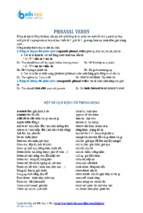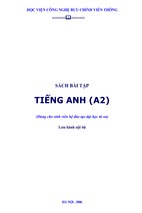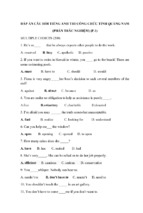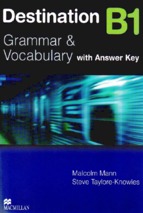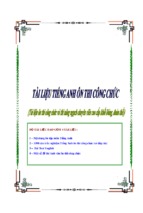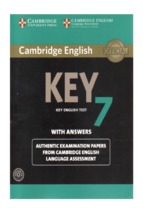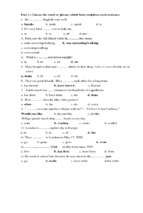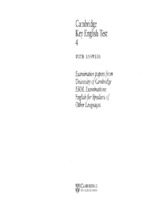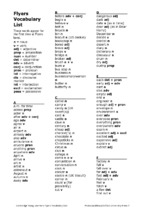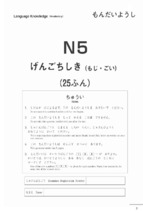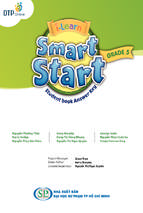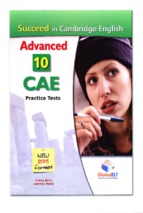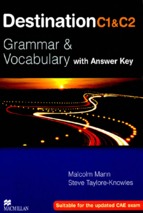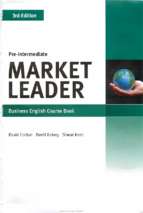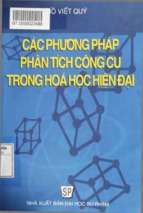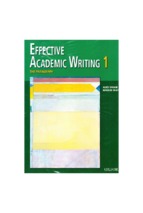how_to_build_a_super_vocabulary
ffirs.qxd
6/28/04
1:36 PM
Page iii
(PANTONE 2627 U plate)
Wiley Keys to Success
HOW TO BUILD A
SUPER VOCABULARY
Beverly Ann Chin, Ph.D.
Series Consultant
John Wiley & Sons, Inc.
ffirs.qxd
6/28/04
1:36 PM
Page vi
(PANTONE 2627 U plate)
ffirs.qxd
6/28/04
1:36 PM
Page i
(PANTONE 2627 U plate)
Wiley Keys to Success
HOW TO BUILD A
SUPER VOCABULARY
ffirs.qxd
6/28/04
1:36 PM
Page ii
(PANTONE 2627 U plate)
Beverly Ann Chin is Professor of English, Director of the English
Teaching Program, former Director of the Montana Writing Project, and
a former President of the National Council of Teachers of English.
Dr. Chin is a nationally recognized leader in English language arts
standards, curriculum instruction, and assessment. Many schools and
states call upon her to help them develop programs in reading and writing across the curriculum. Dr. Chin has edited and written numerous
books and articles in the field of English language arts. She is the
author of On Your Own: Writing and On Your Own: Grammar.
ffirs.qxd
6/28/04
1:36 PM
Page iii
(PANTONE 2627 U plate)
Wiley Keys to Success
HOW TO BUILD A
SUPER VOCABULARY
Beverly Ann Chin, Ph.D.
Series Consultant
John Wiley & Sons, Inc.
ffirs.qxd
6/28/04
1:36 PM
Page iv
(PANTONE 2627 U plate)
This book is printed on acid-free paper.
Copyright © 2004 by BOOK BUILDERS LLC. All rights reserved.
Developed, Designed and Produced by BOOK BUILDERS LLC
Published by John Wiley & Sons, Inc., Hoboken, New Jersey
Published simultaneously in Canada
No part of this publication may be reproduced, stored in a retrieval system, or transmitted
in any form or by any means, electronic, mechanical, photocopying, recording, scanning,
or otherwise, except as permitted under Section 107 or 108 of the 1976 United States
Copyright Act, without either the prior written permission of the Publisher, or authorization through payment of the appropriate per-copy fee to the Copyright Clearance Center,
222 Rosewood Drive, Danvers, MA 01923, (978) 750-8400, fax (978) 646-8600, or on the
web at www.copyright.com . Requests to the Publisher for permission should be addressed
to the Permissions Department, John Wiley & Sons, Inc., 111 River Street, Hoboken, NJ
07030, (201) 748-6011, fax (201) 748-6008.
Limit of Liability/Disclaimer of Warranty: While the publisher and the author have used
their best efforts in preparing this book, they make no representations or warranties with
respect to the accuracy or completeness of the contents of this book and specifically disclaim any implied warranties of merchantability or fitness for a particular purpose. No
warranty may be created or extended by sales representatives or written sales materials.
You should consult with a professional where appropriate. Neither the publisher nor the
author shall be liable for any loss of profit or any other commercial damages, including
but not limited to special, incidental, consequential, or other damages.
For general information about our other products and services, please contact our
Customer Care Department within the United States at (800) 762-2974, outside the United
States at (317) 572-3993 or fax (317) 572-4002.
Wiley also publishes its books in a variety of electronic formats. Some content that
appears in print may not be available in electronic books. For more information about
Wiley products, visit our web site at www.wiley.com .
Library of Congress Cataloging-in-Publication Data:
How to build a super vocabulary / Beverly Ann Chin, series consultant.
p. cm.
Includes index.
ISBN 0-471-43157-5 (pkb. : alk. paper)
1. Vocabulary.
PE1449.H588 2004
428.1—dc22
Printed in the United States of America
10 9 8 7 6 5 4 3 2 1
2004002248
ffirs.qxd
6/28/04
1:36 PM
Page v
(PANTONE 2627 U plate)
DEAR STUDENTS
Welcome to the WILEY KEYS TO SUCCESS series! The books in this
series are practical guides designed to help you be a better student.
Each book focuses on an important area of schoolwork, including
building your vocabulary, studying and doing homework, writing
research papers, taking tests, and more.
Each book contains seven chapters—the keys to helping you
improve your skills as a student. As you understand and use each key,
you’ll find that you will enjoy learning more than ever before. As a
result, you’ll feel more confident in your classes and be better prepared
to demonstrate your knowledge.
I invite you to use the WILEY KEYS TO SUCCESS series at
school and at home. As you apply each key, you will open the doors to
success in school as well as to many other areas of your life. Good
luck, and enjoy the journey!
Beverly Ann Chin, Series Consultant
Professor of English
University of Montana, Missoula
ffirs.qxd
6/28/04
1:36 PM
Page vi
(PANTONE 2627 U plate)
ffirs.qxd
6/28/04
1:36 PM
Page vii
(PANTONE 2627 U plate)
NOTE TO TEACHERS,
LIBRARIANS, AND PARENTS
The WILEY KEYS TO SUCCESS series is a series of handbooks
designed to help students improve their academic performance.
Happily, the keys can open doors for everyone—at home, in school,
at work.
Each book is an invaluable resource that offers seven simple, practical steps to mastering an important aspect of schoolwork, such as
building vocabulary, studying and doing homework, taking tests, and
writing research papers. We hand readers seven keys—or chapters—
that show them how to increase their success as learners—a plan
intended to build lifelong learning skills. Reader-friendly graphics, selfassessment questions, and comprehensive appendices provide additional information.
Helpful features scattered throughout the books include “Getting It
Right,” which expands on the text with charts, graphs, and models;
“Inside Secret,” which reveals all-important hints, rules, definitions, and
even warnings; and “Ready, Set, Review,” which makes it easy for students to remember key points.
WILEY KEYS TO SUCCESS are designed to ensure that all students have the opportunity to experience success. Once students know
achievement, they are more likely to become independent learners,
effective communicators, and critical thinkers. Many readers will want
to use each guidebook by beginning with the first key and progressing
systematically to the last key. Some readers will select the keys they
need most and integrate what they learn with their own routines.
ffirs.qxd
6/28/04
1:36 PM
viii
Page viii
(PANTONE 2627 U plate)
Note to Teachers, Librarians, and Parents
As educators and parents, you can encourage students to use the
books in this series to assess their own strengths and weaknesses as
learners. Using students’ responses and your own observations of their
study skills and habits, you can help students develop positive attitudes, set realistic goals, form successful schedules, organize materials,
and monitor their own academic progress. In addition, you can discuss
how adults use similar study strategies and communication skills in
their personal and professional lives.
We hope you and your students will enjoy the WILEY KEYS TO
SUCCESS series. We think readers will turn to these resources time
and time again. By showing students how to achieve everyday success,
we help children grow into responsible, independent young adults who
value their education—and into adults who value learning throughout
their lives.
Beverly Ann Chin, Series Consultant
Professor of English
University of Montana, Missoula
ftoc.qxd
6/28/04
1:37 PM
Page ix
(PANTONE 2627 U plate)
CONTENTS
Introduction 1
1: Know the History of Language
2: Find the Roots
15
3: Use Context Clues
27
4: Use Your Tools 37
5: Tackle the Tough Ones
47
6: Build Your Vocabulary
57
7: Use the Best Words
The Ultimate Word List
Index 107
73
65
3
ftoc.qxd
6/28/04
1:37 PM
Page x
(PANTONE 2627 U plate)
cintro.qxd
6/26/04
2:23 PM
Page 1
(PANTONE 2627 U plate)
INTRODUCTION
T
he English language is huge, immense, enormous, titanic,
prodigious. (All of these words mean “very large.”) The big, fat
unabridged dictionaries have about half a million entry words.
Language experts estimate that English may have as many as a million
words if you count scientific and technical terms. And like all living
languages, English keeps growing all the time.
So how many English words do you know already? Probably many
thousands. But just as you wouldn’t stay with the vocabulary you had
when you were two or three years old, you won’t stay with the one you
have now. Your vocabulary will keep growing as you meet new words
in your reading and hear them in conversations, on radio, or on TV.
Your vocabulary is directly related to your success in school. That’s
why there are so many vocabulary questions on state and national
standardized tests. Readers who evaluate your writing on essay tests
also focus on your vocabulary, to make sure you use words precisely
and correctly.
The book you are holding, How to Build a Super Vocabulary, is a
resource and reference book that can help you enlarge your vocabulary. It introduces you to many new words to use when you write, read,
speak, and listen.
cintro.qxd
6/26/04
2:23 PM
Page 2
(PANTONE 2627 U plate)
Introduction
2
You can also learn strategies—systematic approaches—for discovering the meaning of unfamiliar words:
G
Recognize different kinds of context clues that enable you to
make an educated guess about the meaning of an unfamiliar
word in your reading.
G
Learn how a dictionary and a thesaurus can help expand your
vocabulary, especially when you’re writing.
G
Recognize the meanings of some of the most familiar roots, prefixes, and suffixes. Those word parts will help you puzzle out
the meaning of many unfamiliar English words.
G
Put the new words you acquire to good use in your speaking and
writing.
G
Avoid some of the mistakes and mix-ups that can happen when
you use English words.
At the back of this book, you’ll find “The Ultimate Word List,” a
mini-dictionary of words that will help you focus on strengthening your
personal weak spots. Some of these are words you’re expected to
know now. Others are words that you’re challenged to learn. One long
list has words from different content areas, and another contains
words commonly found on standardized tests.
“The Ultimate Word List” is just a starting point. Use those words in
sentences. Make them your own.
By the time you finish reading this book, your vocabulary will have
grown considerably. You’ll also have gained skills and strategies that
you can apply to any unfamiliar word you meet—for the rest of your
life.
c01.qxd
6/26/04
2:25 PM
Page 3
(PANTONE 2627 U plate)
KEY 1
KNOW THE HISTORY
OF LANGUAGE
� Theories About How Language Began
� How Language Changes
� Looking at Some Interesting Words
Isn’t it amazing that all over
the world newborn babies
grow up to speak the language
that their parents speak? If
you had been born in France,
you’d be speaking French.
M
aybe you can speak, read, write, or understand two languages. That would make you bilingual. (You’d be trilingual
if you could speak three languages; some people speak
even more.) Your native language, or “mother tongue,” is the first language you learned, most likely the one you speak at home. Now you
may be taking a foreign-language course in school.
c01.qxd
6/26/04
2:25 PM
4
Page 4
(PANTONE 2627 U plate)
How to Build a Super Vocabulary
Theories About How Language Began
Words give you power. They give you the ability to share your
thoughts and ideas. Written words can help you tune in to the
thoughts of people who lived long ago or who live far away. Words also
help you to imagine anything—experiences you’ve never had and
events far into the future. (For a sampling of some English words and
the ideas they let you express, see the words on “The Ultimate Word
List” at the back of this book.)
No one knows when or how language first began. Linguists, the
experts who study language, have some theories, or ideas, about the
origin of language.
Language as Instinct
Many modern linguists think the human brain is hard-wired for language. Your ability to speak and understand words is instinctual,
meaning it comes naturally. This ability makes you different from all
other species. Babies learn to speak spontaneously—without formal instruction. The babbling or nonsense sounds that infants make are part
of learning the vocabulary and grammar of their native language.
Say It with Gestures
Some linguists believe that before people used language, they communicated with gestures, movements of their hands and arms. The earliest
people conveyed meaning by making faces, pointing, motioning, or
touching objects. Gradually, they began to use sounds that they agreed
would stand for the objects around them. Those sounds were the first
words.
Words enabled people to talk about things they could not see or
touch. In the middle of summer, for instance, they could talk about the
snow and ice that would come in winter. And even though the sun was
c01.qxd
6/26/04
2:25 PM
Page 5
(PANTONE 2627 U plate)
Know the History of Language
5
shining brightly, they could talk about the moon and stars they could
not see until nighttime.
The Bowwow Theory
This theory and the next two were popular during the nineteenth century but aren’t endorsed by most linguists today. (Their names make fun
of these theories.) Some people believed that language began when people imitated the sounds made by the things they were describing. Roar,
buzz, and crash, for instance, are echoic, or onomatopoeic, words. That
means the spoken words sound like the sounds they are describing.
K
E
Y
1
c01.qxd
6/26/04
2:25 PM
6
Page 6
(PANTONE 2627 U plate)
How to Build a Super Vocabulary
According to the linguist Mario Pei, the sound of a sneeze is written
differently in different languages. You’d write ker-choo in English, gugu in Japanese, hah-chee in Chinese, and ap-chi in Russian.
Yo-Ho, Heave-Ho Theory
Other linguists believed that language came from the sounds (grunting,
groaning, and rhythmic chanting) that people made as they worked together at some task. No one knows what those grunts, groans, and
chants sounded like. (“Yo ho, heave-ho” is a chant that sailors sometimes used as they pulled together on a rope.) For the earliest speakers, language was especially useful while hunting, sharing food, and
protecting themselves from attacks.
The Pooh-Pooh Theory
The English naturalist Charles Darwin (1809–1882) believed that language developed from instinctive cries that humans made to express
emotions, such as fear, anger, pleasure, and pain. For instance, you
might say “mmmm” when you are licking a chocolate ice-cream cone
or “ow!” when someone steps on your toe.
So What Do You Think?
Remember, those are all theories—guesses about why something happens. No one knows for sure why and how language began. Which theory
about the origin of language makes the most sense to you? Why? Can
you think of another explanation for the first human speech?
How Language Changes
Languages are changing and growing all the time. That’s true
not just for English but for every living language. (A living language is
one that’s still being spoken.) Languages change in three basic ways.
c01.qxd
6/26/04
2:25 PM
Page 7
(PANTONE 2627 U plate)
Know the History of Language
7
New Words Come
New words are coined—made up—to describe scientific discoveries
and new inventions and experiences. Fax (short for facsimile) entered
English in the 1980s, when the device for transmitting documents
through phone lines was invented. Think of e-mail, smog, software,
robotics, laser, and hologram—all those words came along in the late
twentieth century.
Old Words Go
Gradually, words disappear because they are no longer used. Thee,
thou, and ye are archaic (no-longer-used) forms of you. You might find
the archaic ere (before) or o’er (over) in poetry but not in speech.
Meanings Change
A word may stay, but its meaning may change. Whoever could imagine
that the word bead meant “prayer” when it began in Middle English? Or
that there’d be this new meaning for the word burn: You can burn a CD
from online music files. Slang, a form of informal speech, gives us a
never-ending supply of new meanings for old words. Cool, for example,
once referred only to temperature. For many decades, cool has meant
“excellent” or “very good.”
Looking at Some Interesting Words
Every word has a story. Most English words have come a long
way through many languages. A dictionary tells a word’s history
in an etymology that’s usually printed after the pronunciation and before the definitions. Etymologies trace the origin and development of
words. They show a word’s original language and form and other languages and forms the word has moved through as it has developed.
K
E
Y
1
c01.qxd
6/26/04
2:25 PM
8
Page 8
(PANTONE 2627 U plate)
How to Build a Super Vocabulary
erbs
Nouns Become V in which language
ys
meanOne of the wa
s take on new
rd
o
w
t
a
th
is
s
change
of speech also
rt
a
p
e
th
s
e
m
arts
ings. Someti
le, someone st
p
m
a
x
e
r
o
F
s.
y
change
and eventuall
,
rb
e
v
a
s
a
n
ome
using a nou
widespread. S
s
e
m
o
c
e
b
e
g
ethat usa
s nouns and b
a
t
u
o
d
e
rt
a
st
words that
(from
clude babysit
n).
came verbs in
(from intuitio
it
tu
in
d
n
a
)
babysitter
Here are some recent examples of verbs made
from nouns.
G
Will you please e-mail me the date and time of your arrival?
G
Stacy’s grandmother faxed her the recipe for potato pancakes.
G
When he was searching for a job, Runar networked with his
former classmates and everyone else he knew.
G
Lauren hopes to broker a new contract with her employer.
- Xem thêm -

